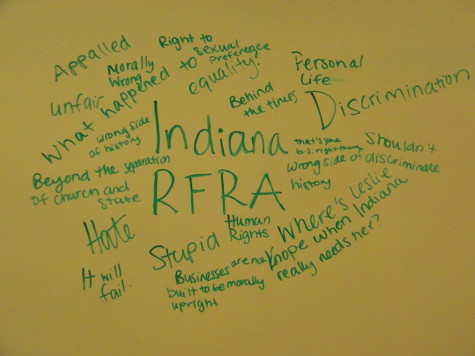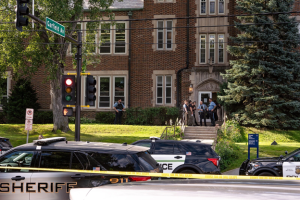Indiana RFRA
May 20, 2015

Bolles students’ reactions to the RFRA
In a recent move to restore religious rights to the most common religion in the country, Indiana has passed what they are calling a Religious Freedom Restoration Act, which allows business owners to discriminate against people based on sexuality and gender identity. The act has sparked national controversy, even causing some states to restrict employees from using federal funds to travel there. In the opening made by this controversy, Arkansas has taken the opportunity to pass a similar law.
20 states, including Florida, have already passed Religious Restoration Acts, and another 12 are trying to pass one. On the other end of the argument, 20 states have passed anti-discrimination laws in housing and public accommodations, and 28 have passed them for employment.
Though Florida is generally supportive of increased religious protection, lawmakers have not been tempted to increase the restrictiveness of the RFRA in the state. In fact, Florida lawmakers have been considering an anti-discrimination law.
Some people think that the law is necessary to protect the religious rights of shop owners who are uncomfortable serving people of different sexualities. The law allows people to avoid discomfort that may be caused by serving said people, and these people cite the first amendment as the source of their right to discriminate because of religious beliefs.
However, the first amendment does not give the right to push religious beliefs onto other people, especially in ways that affect lives. The United States believes in the separation of church and state, meaning that it shouldn’t fall to the government to support the religious rights of some over those of other people. This is exactly what has happened in Indiana.
From an economic perspective, the law could hurt businesses that take advantage of it. The last time a pizza place passed a discriminatory law, it lost so much money that it had to close.
However, recent Supreme Court decisions-such as in the Hobby Lobby case- have supported religious rights for corporations, often in ways that have direct effects on peoples’ lives.
Religious Freedom Restoration Acts have a long history in the U.S. The first RFRA was passed to maintain religious rights of Native Americans, especially concerning the ceremonial use of peyote. Many of the states with Native American reservations in them have passed RFRAs for the same reason, but other states passed them for other reasons. The Indiana bill is solely meant to restrict the rights of the LGBTQIA+ community in Indiana.
This bill is not necessary in any way. It restricts the rights of people of different sexualities to use services, especially those involving marriage. Even though more than 30 states, including Indiana, have legalized gay marriage, there are still severe restrictions on gay couples in the U.S.






